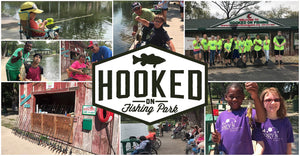Conservation Alliance Partner - Hooked on Fishing Park
Angler’s Coffee is honored that Soul River was our inaugural Conservation Alliance partner. As shared in our profile on the organization’s founder, Chad Brown, Soul River brings veterans and inner-city youth together along wild rivers in the hope that it encourages them to grow and become ambassadors of our natural environment. As part of our partnership, Angler’s is donating a percentage of our sales to Soul River.
Now, continuing our support of organizations that welcome everyone to fly fishing, Angler’s highlights the work of Hooked On Fishing Park (HOF). This beautiful place, southwest of Chicago, offers youth, seniors, veterans, and special needs groups free access to education in fishing and water conservation—and, of course, to glorious days casting on the water!
We chose HOF as our next Conservation Alliance partner after a video call with the park’s new executive director, Adam Singley. Our partnership began with coffee donations to help build HOF’s online presence but quickly grew as we realized we had a lot in common. On a personal note, I am very happy and proud that we are able to support HOF, and help Adam fulfill his vision. Being the father of a severely disadvantaged son, the great work that this organization is performing, strikes very near and dear to me.
HOF started in 2008, the realization of a vision by avid outdoorsman Mike O’Riley. The park runs along the Illinois River and includes what was once stock ponds for a local seafood market that is still active. Later, Dixon’s Seafood Market opened a “pay to fish” park to the public. O’Riley couldn’t help but think, what if this became an opportunity available to everyone, not just those who could afford to pay and who were already experienced fishers? Thanks to his work and resources, Dixon’s now leases the land to HOF.
The park offers guests three ponds, one of which is accessible to people with special needs. The ponds are fed by hundreds of springs and artesian wells, leading to the water being as clear as mountain streams and the feeder pond temperature never exceeding sixty-four degrees. The ponds are full of bluegills, along with large and smallmouth bass, channel catfish, bullhead catfish, crappie, and carp.

Carp “are especially fun on a fly rod,” Singley says. “And if you haven’t stuck a smallmouth bass that chased your fly from its shady spot in a shallow creek from fifteen feet away, you’re missing out!” Fly fishing is coming to HOF for the first time this season. “Illinois isn’t exactly known for its fly culture,” Singley explains, though he hopes to change that in his leadership role at HOF, if even a little bit. HOF is working on putting together fly tying classes and fly tying nights to spark interest and connect with those who may be “fly-curious.” He says, “You don’t have to be rich to fly fish, and you don’t even have to wear a goofy hat. It’s about trying something out of the norm and connecting with the water and the fish in a way you never have.”
Groups spend two to three hours at the park. Each excursion begins with the group getting familiar with safety and other guidelines. Then, just like all fishers do, Singley says, “we tell them a few fish stories and maybe a few lies about the fish that lurk in our waters.” Once everyone is geared up, it’s off to the ponds.
The volunteer instructors are mostly retired people who love fishing and are looking to give back to the community. In fact, one of those volunteers ran the whole park its first few years. Bob Meiss is still at the park most days and sits on the board of directors. Singly says, “Whenever we get in the weeds of a board meeting, Bob will usually say something to the effect of ‘Do whatever—I just want to teach kids to fish!’”
The instructors lead groups in the practice of catch-and-release: “catch the fish, take the pic, and get it back in the water,” Singley explains. They also talk about fish being natural resources that can be harvested and consumed responsibly and within state regulations elsewhere.

Most of their conservation discussion is around the importance of springs in the ecosystem and packing out what you carry in—they are planning several “pitch in” initiatives, encouraging people to pick up trash when out fishing on public land. Other issues crop up. For example, spring floods have always been an issue at the park, but lately they have delayed the spring season by several weeks. Trout used to be stocked in the feeder pond, but due to trespassers, both human and otter, the trout population has suffered.
These mornings and afternoons on the water fulfill a need of nursing homes, senior citizen and veterans facilities, group homes, and day camps and daycares: “All of these entities are always searching for activities to enrich the lives of their students or residents,” Singley says, “and we believe there really isn’t anything more rich than time in the outdoors and wetting a line.” He sees the importance of serving both ends of the age spectrum: “If you can get a kid hooked up with a fish of any size, they will remember that for years to come, and maybe one of our senior guests fished many years ago when they were independent but have lost the ability to get themselves to their favorite fishing hole.” Singley also says that it doesn’t matter a guest’s ability: “As far as our friends with special needs are concerned, there isn’t a group that touches my heart more. The pure elation when reeling in a fish, whether verbal or not, is unmistakable. Their smiles couldn’t be any bigger.”
The park is open to the public on Sundays, which Singley considers crucial to helping to pull everyone away from our electronic devices. “It’s my goal to replace what is synthetic with real experiences that form lifelong memories. Being outside is good for the body and soul.”
That was how Singley got started in fly fishing—when his girlfriend (now wife) moved to a new city, making their relationship long-distance and leaving Singley with a lot of unfilled time, fishing got him out of the house, gave him a social life, and reconnected him to the world around him. He fished every morning before work and every night after work. Now, he loves the rivers and creeks of East-Central Illinois, though a day on St. Andrew’s Bay in the Florida panhandle is perfection. He loves tying foxy shrimp and popping shrimp as well as hoppers for fall mountain trips with his family, and he even builds his own fly rods. “Seriously nothing better than catching a fish on your own flies and rod!” he says.

Because of COVID-19, the park did not open for the 2020 season, but they’re planning—cautiously—for a more normal season this year. Because of lessons learned during COVID and because their land is flooding more and more, one of Singley’s goals is to develop a mobile version of the park. Guests, volunteers, and gear could be transported to other local and not-so-local fishing spots, so programming can go on even when the HOF land can’t be open. “I want to be out putting on fishing clinics and derbies no matter what Mother Nature throws at us,” Singley says.
We can’t end an Angler’s blog post without some discussion of coffee. We asked Singley about his caffeine ritual, and he shared that he chooses Angler’s Wooly Bugger Blend, ideally in his French press, but sometimes he relies on his trusty drip coffee maker as he makes breakfast for his kids. After all, it’s all about community—be it connecting over a meal at home or making new friends on the water. Singley and HOF share a common sentiment: “I know how happy fishing makes me; you just have to share it with people who might otherwise not have the opportunity.”


